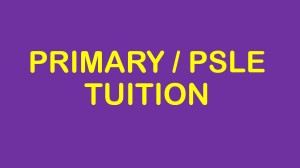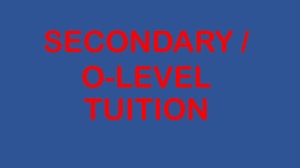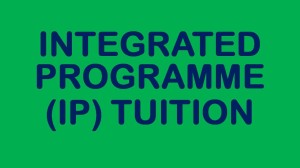The P3 MATH OLYMPIAD PROGRAMME is a 10-session (each session 1.5 hrs, weekly) programme to introduce P3 students to techniques and skills involved in solving non-routine P3 Math questions. As some of these P3 Math Olympiad questions are also similar to the difficult math questions found in P5 or in the PSLE, the heuristics learnt in this course will be useful to these students in their later primary years.
It is widely agreed that some of the non-routine or difficult PSLE Math questions are very similar to Primary Math Olympiad questions. Thus to get an A-Star for PSLE Math it may be necessary to acquire some Primary Math Olympiad problem-solving skills. Hence we encourage ALL primary school students to attend some kind of math Olympiad training before they take their PSLE Math exam. Math Olympiad is not just for students who are currently doing well in Math; we believe it is for EVERY primary student.
Primary Math Olympiad skills may also be useful to students taking the GEP or DSA selection tests.
Level/Subject: P3 MATH OLYMPIAD
Day: Mondays
Time: 4 pm – 5.30 pm
Location: Blk 644, Bukit Batok Central, #01-68. S(650644).
(Our location is just a 3-min walk from either the Bukit Batok MRT station or the Bukit Batok Bus Interchange. Buses that stop along the roads surrounding our location are numbers 157, 178, 66, 506, 173, 174, 176, 187, 985. Buses services which terminate at Bukit Batok Bus Interchange are 61, 77, 106, 173, 177, 189, 852, 941, 945, 947)
The objectives of the programme are as follows:
- To introduce students to heuristics commonly used in Primary Math Olympiad
- To give students confidence in solving non-routine or difficult Math problems.
- To train students to look at Math problems from multiple angles.
- To train students in analytical thinking and logical reasoning.
Focus: CONCEPTUAL UNDERSTANDING & METACOGNITION
Format: Teaching + Worksheets + Discussions
Total Course Fee: $290
TO REGISTER, SMS <STUDENT NAME> , <P3MOLYMP> TO 97860411.
As places are limited, pre-payment is encouraged to confirm your attendance. You can make payment by visiting the centre at the address above.
Course Outline:
|
Tricks in Addition and Subtraction |
|
Tricks in Multiplication and Division |
|
Working Backwards |
|
Finding Cubes |
|
Using Logic |
|
Looking for a Pattern |
|
Solve by Comparison and Replacement |
|
Solving Using Model |
|
Speed – Catching Up & Encountering |
|
Practical Problems |
P4 MATH OLYMPIAD JUNE HOLIDAY ENRICHMENT
The P4 MATH OLYMPIAD JUNE HOLIDAY ENRICHMENT is a 4-day (each day 1.5 hrs) programme conducted during the June school holidays to introduce P4 students to techniques and skills involved in solving non-routine P4 Math questions. As some of these P4 Math Olympiad questions are also similar to the difficult math questions found in P5 or in the PSLE, the heuristics learnt in this course will be useful to these students in their later primary years.
It is widely agreed that some of the non-routine or difficult PSLE Math questions are very similar to Primary Math Olympiad questions. Thus to get an A-Star for PSLE Math it may be necessary to acquire some Primary Math Olympiad problem-solving skills. Hence we encourage ALL primary school students to attend some kind of math Olympiad training before they take their PSLE Math exam. Primary Math Olympiad skills may also be useful to students taking the GEP or DSA selection tests.
Level/Subject: P4 MATH OLYMPIAD
Dates: Tue 2/6, Wed 3/6, Thur 4/6, and Fri 5/6 (four 1.5 hr sessions)
Time: Mornings 11.00 am – 12.30 pm
Location: Blk 644, Bukit Batok Central, #01-68. S(650644).
Our location is just a 3-min walk from either the Bukit Batok MRT station or the Bukit Batok Bus Interchange. Buses that stop along the roads surrounding our location are numbers 157, 178, 66, 506, 173, 174, 176, 187, 985. Buses services which terminate at Bukit Batok Bus Interchange are 61, 77, 106, 173, 177, 189, 852, 941, 945, 947.
The objectives of the programme are as follows:
- To introduce students to heuristics commonly used in Primary Math Olympiad
- To give students confidence in solving non-routine or difficult Math problems.
- To train students to look at Math problems from multiple angles.
- To train students in analytical thinking and logical reasoning.
Focus: CONCEPTUAL UNDERSTANDING & METACOGNITION
Format: Teaching + Worksheets + Discussions
Fee: $120
TO REGISTER, SMS <STUDENT NAME> , <P4MOLYMPJUN> TO 97860411.
As places are limited, pre-payment is encouraged to confirm your attendance. You can make payment by visiting the centre at the address above.
P3 MATH OLYMPIAD JUNE HOLIDAY ENRICHMENT
The P3 MATH OLYMPIAD JUNE HOLIDAY ENRICHMENT is a 4-day (each day 1.5 hrs) programme conducted during the June school holidays to introduce P3 students to techniques and skills involved in solving non-routine P3 Math questions. As some of these P3 Math Olympiad questions are also similar to the difficult math questions found in P5 or in the PSLE, the heuristics learnt in this course will be useful to these students in their later primary years.
It is widely agreed that some of the non-routine or difficult PSLE Math questions are very similar to Primary Math Olympiad questions. Thus to get an A-Star for PSLE Math it may be necessary to acquire some Primary Math Olympiad problem-solving skills. Hence we encourage ALL primary school students to attend some kind of math Olympiad training before they take their PSLE Math exam. Primary Math Olympiad skills may also be useful to students taking the GEP or DSA selection tests.
Level/Subject: P3 MATH OLYMPIAD
Dates: Tue 2/6, Wed 3/6, Thur 4/6, and Fri 5/6 (four 1.5 hr sessions)
Time: Mornings 9.15 am – 10.45 pm
Location: Blk 644, Bukit Batok Central, #01-68. S(650644).
Our location is just a 3-min walk from either the Bukit Batok MRT station or the Bukit Batok Bus Interchange. Buses that stop along the roads surrounding our location are numbers 157, 178, 66, 506, 173, 174, 176, 187, 985. Buses services which terminate at Bukit Batok Bus Interchange are 61, 77, 106, 173, 177, 189, 852, 941, 945, 947.
The objectives of the programme are as follows:
- To introduce students to heuristics commonly used in Primary Math Olympiad
- To give students confidence in solving non-routine or difficult Math problems.
- To train students to look at Math problems from multiple angles.
- To train students in analytical thinking and logical reasoning.
Focus: CONCEPTUAL UNDERSTANDING & METACOGNITION
Format: Teaching + Worksheets + Discussions
Fee: $120
TO REGISTER, SMS <STUDENT NAME> , <P3MOLYMPJUN> TO 97860411.
As places are limited, pre-payment is encouraged to confirm your attendance. You can make payment by visiting the centre at the address above.
P1 ENGLISH & MATH ACADEMIC READINESS ASSESSMENT FOR K2 STUDENTS
Our P1 English & Math Academic Readiness Assessment will be held on Saturday 25th April 2015 at 5.30pm.
The purpose of this assessment is to assist you to gauge your child’s level of academic preparedness for entry into Primary One. Each child develops at his own pace and early intervention on the development of the child’s cognitive skills will be the main aim of our P1 Prep Programme (P1 Prep (English & Math) for K2 students) scheduled to begin on 4th July 2015.
Students will be assessed on their cognitive skills –
English Verbal & Written – 15 mins
Math – 20 mins
Date: Saturday 25 April 2015
Time : 10.30 am – 12 pm or 5.30 – 7.00pm
Cost : $10/- per child.
Location: Blk 644, Bukit Batok Central, #01-68. S(650644).
(Our location is just a 3-min walk from either the Bukit Batok MRT station or the Bukit Batok Bus Interchange. Buses that stop along the roads surrounding our location are numbers 157, 178, 66, 506, 173, 174, 176, 187, 985. Buses services which terminate at Bukit Batok Bus Interchange are 61, 77, 106, 173, 177, 189, 852, 941, 945, 947)
To REGISTER, send <student name> <p1assess> to 97860411 and we will get back to you shortly. Alternatively you may visit our centre to fill up a form and make payment for the assessment.
For enquiries, call 65694897 or SMS to 9786 0411.
We are expanding. Join us as Teaching Partners.
Singapore Learner requires qualified and experienced part-time/full-time tutors for the following subjects:
(1) JC Chemistry
(2) Sec Chemistry
(2) Sec English
(3) Pri English
(4) Pri Math
(5) Pri Science
You must be a Singapore Citizen and a graduate from a local recognised university, preferably with a diploma or certificate from the NIE. To be a full-time tutor, you must be able to teach at least three of the above subjects and you must be able to work on weekends and at least three weekdays.
If you have a passion for coaching young people, and you have decided that your long term career will be in the education industry, you are welcomed to send your resume/CV to principal@singaporelearner.com.
List of ‘Top’ Secondary Schools (2013) in Singapore by Cut-Off PSLE aggregate score (2012)
| Name of School | COP 2013 | Highest Score |
| NANYANG GIRLS’ HIGH SCHOOL | 265 | 280 |
| RAFFLES INSTITUTION | 263 | 284 |
| RAFFLES GIRLS’ SCHOOL (SECONDARY) | 263 | 280 |
| HWA CHONG INSTITUTION | 261 | 277 |
| NATIONAL JUNIOR COLLEGE | 259 | 272 |
| RIVER VALLEY HIGH SCHOOL | 256 | 282 |
| DUNMAN HIGH SCHOOL | 256 | 278 |
| CHIJ ST. NICHOLAS GIRLS’ SCHOOL | 253 | 275 |
| METHODIST GIRLS’ SCHOOL (SECONDARY) | 252 | 267 |
| CEDAR GIRLS’ SECONDARY SCHOOL | 251 | 272 |
| TEMASEK JUNIOR COLLEGE | 251 | 270 |
| SINGAPORE CHINESE GIRLS’ SCHOOL | 251 | 260 |
| ANGLO-CHINESE SCHOOL (INDEPENDENT) | 249 | 261 |
| CATHOLIC HIGH SCHOOL | 249 | 261 |
| BUKIT PANJANG GOVT. HIGH SCHOOL | 246 | 274 |
| VICTORIA SCHOOL | 246 | 268 |
| ANDERSON SECONDARY SCHOOL | 246 | 265 |
| NAN HUA HIGH SCHOOL | 245 | 265 |
| ST. JOSEPH’S INSTITUTION | 245 | 262 |
| CRESCENT GIRLS’ SCHOOL | 244 | 269 |
| CHIJ SECONDARY (TOA PAYOH) | 243 | 251 |
| ANGLICAN HIGH SCHOOL | 242 | 262 |
| ST. MARGARET’S SECONDARY SCHOOL | 241 | 251 |
| NAN CHIAU HIGH SCHOOL | 240 | 266 |
| CHUNG CHENG HIGH SCHOOL (MAIN) | 239 | 258 |
| FAIRFIELD METHODIST SCHOOL (SECONDARY) | 239 | 251 |
| COMMONWEALTH SECONDARY SCHOOL | 238 | 251 |
| SWISS COTTAGE SECONDARY SCHOOL | 237 | 256 |
| TANJONG KATONG GIRLS’ SCHOOL | 236 | 271 |
Related links:
O-LEVEL | SEC | PHYSICS TUITION
O-LEVEL | SEC | A. MATH TUITION
O-LEVEL | SEC 1-4 | MATH TUITION
O-LEVEL | SEC | CHEMISTRY TUITION
O-LEVEL | SEC 1-4 | ENGLISH TUITION
O-LEVEL | SEC 1-4 | MALAY LANGUAGE TUITION
———————————————————————————————————–
_____________________________________________________
TUITION CLASSES:
_______________________________________________________________
EDUCATIONAL SERVICES:
______________________________________________________________
By EX-MOE TEACHERS & EXPERIENCED TUTORS
@ BLK 644, BUKIT BATOK CENTRAL, #01-68. S(650644).
CALL 65694897 OR SMS 98530744 OR 97860411.
PRI 3 – PRI 6 CONCEPTUAL LEARNING SCHEDULE 2014
Classes marked with a ‘*’ are Conceptual Mastery courses whereas those without a ‘*’ are Conceptual Drilling classes.
Conceptual Drilling classes are for students who need to strengthen their maths or science foundation, using constructivist and scaffolding approaches. Conceptual Mastery courses are for students who are ready to learn how to answer or solve challenging questions, using a metacognitive approach.
P3 Math*: Every Monday, 3.00 pm – 4.30 pm (Start Nov 18); Code: P3M1.
P3 Math: Every Wednesday, 3.00 pm – 4.30 pm (Start Nov 20); Code: P3M2.
P3 Science*: Every Thursday, 3.00 pm – 4.30 pm (Start Nov 21); Code: P3S1.
P4 Math: Every Monday, 3.00 pm – 4.30 pm (Start Nov 18); Code: P4M1.
P4 Math*: Every Tuesday, 3.00 pm – 4.30 pm (Start Nov 19); Code: P4M2.
P4 Science*: Every Friday, 3.00 pm – 4.30 pm (Start Nov 22); Code: P4S1.
P5 Math: Every Monday, 4.30 pm – 6.00 pm (Start Nov 18); Code: P5M1.
P5 Math*: Every Tuesday, 4.30 pm – 6.00 pm (Start Nov 19); Code: P5M2.
P5 Math: Every Saturday, 3.30 pm – 5.00 pm (Start 11 Jan); Code: P5M3.
P5 Science: Every Wednesday, 4.30 pm – 6.00 pm (Start Nov 20); Code: P5S1.
P5 Science*: Every Friday, 4.30 pm – 6.00 pm (Start Nov 19); Code: P5S2.
P5 Science: Every Saturday, 5.00 pm – 6.30 pm (Start 11 Jan); Code: P5S3.
P6 Math: Every Monday, 6.00 pm – 7.30 pm (Start Nov 18); Code: P6M1.
P6 Math*: Every Tuesday, 6.00 pm – 7.30 pm (Start Nov 19); Code: P6M2.
P6 Math*: Every Saturday, 9.30 am – 11.00 am (Start Nov 23); Code: P6M3.
P6 Math: Every Saturday, 12.30 pm – 2.00 pm (Start Nov 23); Code: P6M4.
P6 Science*: Every Friday, 6.00 pm – 7.30 pm (Start Nov 22); Code: P6S1.
P6 Science: Every Wednesday, 6.00 pm – 7.30 pm (Start Nov 20); Code: P6S2.
P6 Science*: Every Saturday, 11.00 am – 12.30 pm (Start Nov 23); Code: P6S3.
P6 Science: Every Saturday, 2.00 pm – 3.30 pm (Start Nov 23); Code: P6S4.
P6 Math: Every Monday, 6.00 pm – 7.30 pm (Start Nov 18); Code: P6M1.
P6 Math*: Every Tuesday, 6.00 pm – 7.30 pm (Start Nov 19); Code: P6M2.
P6 Math*: Every Saturday, 9.30 am – 11.00 am (Start Nov 23); Code: P6M3.
P6 Math: Every Saturday, 12.30 pm – 2.00 pm (Start Nov 23); Code: P6M4.
P6 Science*: Every Friday, 6.00 pm – 7.30 pm (Start Nov 22); Code: P6S1.
P6 Science: Every Wednesday, 6.00 pm – 7.30 pm (Start Nov 20); Code: P6S2.
P6 Science*: Every Saturday, 11.00 am – 12.30 pm (Start Nov 23); Code: P6S3.
P6 Science: Every Saturday, 2.00 pm – 3.30 pm (Start Nov 23); Code: P6S4.
Administrative Matters:
Location: Blk 627, Bukit Batok Central. Our location is just a 3-min walk from either the Bukit Batok MRT station or the Bukit Batok bus interchange. Buses that stop along the road in front of Blk 627 are numbers 157, 178, 66, 506, 173, 174, 176, 187, 941, 947, 985.
Max Class Size: 8
Monthly fee for each subject or slot for P6/P5/P4/P3 is $110/110/90/90 respectively, inclusive of materials fee. Discounts apply for multiple subjects or slots.
TO REGISTER, SMS <FULL STUDENT NAME>, <CODE> TO 97860411.
For enquiries, kindly call or sms to 9786 0411.
Something is wrong if your child cries during or after an exam.
Today, both my P5 and P3 daughters told me that some of their classmates were in tears after their Math SA1 exams.
When children cry during or after an exam, it is not simply because the paper is too difficult. Personally I have encountered many difficult test and exam papers in my life, but I have not cried even once because of them. Nope, I don’t think it was because I was a boy; I can’t even imagine my daughters crying because of exams. If they do, then I know I’ve failed as a parent as far as their psychological development is concerned.
Yes, it’s about expectations, or setting them too high, and warning about consequences should the targets not be achieved. Looking back, my parents hardly ever asked me about my school work, and when I told them I would do badly in a paper, they would just comfort me and at worst joined me in my sadness! No scoldings, no cancellation of rewards, not a single kind of punishment or threat.
Yes, I do expect my daughters to do well in their studies, but I do not tie the outcome to rewards or punishment. I give them rewards because I love them, not necessarily because they deserve those rewards. I punish them for wrongdoings, not for performances in tests or exams.
Maybe those children cried because they have too high an expectation of themselves. Then it is their parents’ duty to help them manage their expectations (if the parents can manage their own expectations of course). Or maybe some children just cry easily at the slightest encounter with a difficulty or setback? Whatever the case, children are children and I wouldn’t hold THEM responsible for anything.
Rgds,
Ilyasa
My P5 daughter topped her class in a recent science test.
She obtained 28 out of 30 marks. Of course immediately I asked her about the missing two marks (as though the 28 are not important, but hey, i’m Singaporean u know).
Rahmah has formal science tuition once a week, taught by Mr Lim at my home centre. But almost everyday, she gets to ask her elder sister, my wife and me about science. She’s not really interested in science, except for rocks and minerals which she buys and collects.
My technique is to teach my children science whenever and wherever I can, as my time with them is not much (when I’m free, they would be in school and when they are ‘free’, I would be giving tuition to other people’s children).
Of course it helps that I’m a physics tutor, with lots of knowledge about chemistry as well. I only get irritated when my children ask me about factual biology questions, such as the parts of a plant cell. For that, I normally ask them to use the internet. This is to develop them to be more resourceful and not to immediately rely on others for answers.
If you want your children to be good in science, ask them to read a lot about science and make them think about what they see around them. For eg, ask them why is it easier to cut chicken with a knife than with a metal ruler. In science, you can’t just say it is because the knife is sharper; the scientific answer has to do with force and surface area, or pressure.
Rgds,
Ilyasa
===============================================================
For our latest timetable, click here => 
An important PSLE math concept to understand (Part 1)
Let me share with you a difficult concept normally tested in P5 or P6 Math. I’m not sure if it has a name. It makes use of the concept of difference between two values but it’s not the same as the Constant Difference concept, which refers to the idea of a particular difference between two values being the same despite making changes to other quantities. The concept that I’m about to introduce actually makes use of TWO differences, the difference between individual values and the difference in their total values. Quite a number of tough P6 qns are actually testing whether students know that there is a relationship between the difference between two individual values and the difference in their total values.
I think this is best explained without any unknown values. Let’s say a pencil costs $1 and a pen costs $1.50. The difference in their values is $0.50 right? Let’s call this the Individual Difference. Let’s say you purchase 10 of each, costing a total of $10 and $15 respectively. The difference in their total values is $5 right? Let’s call this the Total Difference. Is there a relationship between the Individual Difference (ID) and the Total Difference (TD)? Yes. Notice that if TD is divided by ID (5 / 0.50), what you’ll get is 10, which is the number of each item you purchased. If this is easy for you to understand, it is likely because all values are known and you were working forwards to find the total difference, and not working backwards to find the number of each item bought.
Let me now show you how a typical P6 question looks like:
John bought an equal number of pens and pencils. Each pencil costs 50 cents less than a pen. John paid a total of $5 more for the pens than for the pencils. How many pencils did John buy? (using TD/ID, the answer is 10. but notice how intriguing the question has become?)
Please also realise that the concepts of ratio, decimals, fractions and percentages are all related and interchangeable. So let’s make the above question harder:
John bought some pens and pencils. The ratio of the number of pencils he bought to the number of pens is 1:1. Each pencil costs $1 and each pen costs 50% more than a pencil. John paid a total of $5 less for the pencils than for the pens. What is the total number of pens and pencils that John bought? (answer: 20)
Another way of looking at the above problem is to see that since each pencil costs 50 cents less than each pen, it must have taken 10 of them to be a total of $5 less than the SAME quantity of pens.
Rgds,
Ilyasa,
Founder, Singapore Learner; Director, Concept Learning Pte Ltd
Related links:
(1) Challenging PSLE Math Programme for Medium to High Ability Students
(2) P6 MATH & SCIENCE, March & June INTENSIVE REVISION For PSLE 2013
===============================================================
For our latest timetable, click here => 






